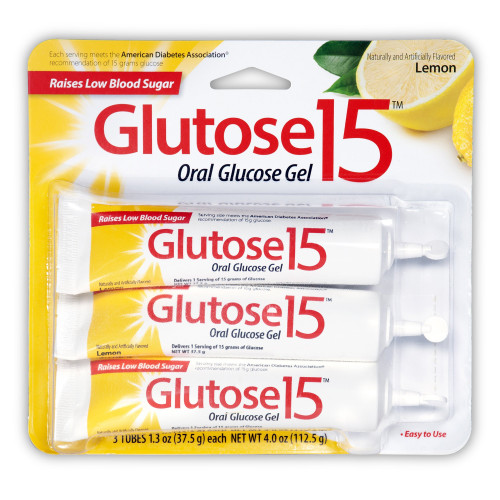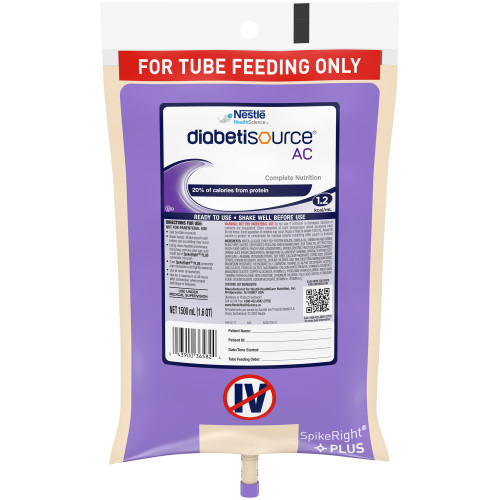-

GlucoCrush
GlucoCrush Glucose Tolerance Beverage 10 oz. per Bottle
GlucoCrush Clucose Tolerance beverages are a non-carbonated drink used to screen for diabetes and low blood sugar. Screening involves adminstering a precise dose of glucose and then testing the glucose levels in the blood. One bottle contains 10 fluid...
As low as $19.10 -

Boost
Boost Glucose Control Max Oral Supplement, Adult, 11 oz, 160 cals
Boost Glucose Control Max balanced nutritional drink contains 30 Grams of protein (14 Grams more than regular Boost Glucose Control), 1 Gram sugars, 160 nutrient-rich calories and is intended to produce a lower blood sugar response (as compared to a...
As low as $54.11 -

Dr. John's Candies
Dr. John's Candies Fruit Punch Sugar-Free Lollipop 2.5 lb. Individually Wrapped
Package Count: 132. Sugar-free lollipops are a great way to reward children for being good patients or for just being patient. This sweet treat will be appreciated by those of all ages. In each bag are 2½ pounds of blue raspberry, cherry, grape, lemon,...
$78.20 -

YumV's
YumV's 4 Gram Strength Gummy Glucose Supplement 60 per Bottle
Package Count: 60. Those with diabetes may experience low blood sugar levels because the insulin they are taking is removing too much sugar from their blood. A quick and easy way to resolve this, is to chew one of these YumVs Complete Glucose...
$16.52 -

TRUEplus
TRUEplus 4 Gram Strength Chewable Tablet Glucose Supplement 10 per Bottle
Package Count: 720. Those with diabetes may experience low blood sugar levels because the insulin they are taking is removing too much sugar from their blood. A quick and easy way to resolve this is to ingest one of these TRUEplus orange flavor glucose...
$129.99 -

Boost
Boost Glucose Control Balanced Nutritional Drink, Adult, 8 oz, 190 cals
Meet your body's regular nutrition needs and manage diabetes at the same time with Boost® Glucose Control® by Nestle. An 8-ounce carton of Nestle Boost Glucose Control drink counts as one carb choice. It has 4 grams of sugar, keeping intake and glucose...
As low as $61.32 -

Diabetisource
Diabetisource AC Complete Nutrition, Tube Feeding Formula, 8.45 oz
Diabetisource Advanced Control complete nutrition tube feeding formula contains a unique carbohydrate blend that includes pureed fruits and vegetables to help with the nutritional management of blood glucose levels.Carbohydrate blend includes pureed...
As low as $14.01 -

Perrigo
Perrigo 40% Strength Gel Glucose Supplement 3 per Pack
Package Count: 3. Glutose 15 delivers 15 grams of pure glucose (dextrose) for rapid response to hypoglycemia.15 grams of carbohydrates, in a one-dose tube, eliminating counting, chewing, and measuring Convenient to carry or store wherever you travel,...
$22.00 -

Glucerna
Glucerna Shake Nutritional Oral Supplement, Adult, 8 oz, 190 cals
For people with diabetes, Glucerna Shake is designed as a meal or snack replacement to help minimize blood sugar spikes compared to high-glycemic carbohydrates. For oral use. For supplemental nutrition. Use under medical supervision as part of a diabetes...
As low as $11.22 -

Boost
Boost Glucose Control Nutritional Drink 6-Pack
Boost Glucose Control drink is a balanced nutritional drink specially formulated to provide nutritional support for individuals with diabetes, carbohydrate controlled diets, or general oral supplement needs for people with diabetes. It provides a...
As low as $30.79 -

Diabetisource
Diabetisource AC Unflavored Tube Feeding Formula 1500 mL Ready to Hang Prefilled Container
Package Count: 4. This Diabetisource AC formula allows diabetic individuals who use a feeding tube to meet their daily nutritional needs. It contains essential vitamins and minerals to help promote overall health and vitality. A carbohydrate blend in...
$126.79 -

Gelatein 20
Gelatein 20 g Sugar Free Protein Supplement, 4 oz Cup
A high protein fortified gelatin for increased protein needs or dysphagia.Sugar free Low electrolyte Ready to serve high protein, sugar free gelatin dessert 20 grams of protein per serving Low volume Shelf stable Serve chilled Perfect for renal and...
As low as $81.30
Blood Sugar Support

Diabetic Supplements
Blood glucose control supplements are not the same as diabetes medication. Blood sugar support covers a range of products, from dietary supplements such as vitamins and minerals to diabetic nutrition such as meal-replacement shakes and snack bars.
Supplements for diabetics, and diabetic nutritional supplies, should be part of a comprehensive diabetes management plan under the supervision of your doctor and other members of your diabetes care team.
Nutritional Shakes and Snack Bars for Blood Sugar Support
Nutritional shakes and snack bars can replace all or part of a meal or snack. They’re formulated to provide the optimal protein, fat, and carbohydrates balance for those with diabetes. When used correctly, they can reduce the likelihood of post-meal spikes in blood glucose. They may also be helpful as a part of a weight-loss or weight control program, which is often part of diabetes treatment.
Carbohydrates have the largest effect on blood sugar, so nutritional shakes and bars intended for people with diabetes rely on carbohydrates with a low glycemic index. These “slow-release” carbohydrates take more time for your body to digest and convert to glucose. That helps minimize blood sugar spikes. They also contain a variety of important nutrients (specific nutrients vary depending on the brand) to help support glucose control.
The downside to shakes, snack bars, and other nutritional products is that they often contain artificial sweeteners, which may be a problem for some people. Standard meal replacement products — those not specifically designed for people with diabetes — are likely to rely on sugar for their carbohydrate content. So, when choosing the right product for you, look for something intended for people with diabetes.
Supplements for Blood Sugar Support
There are many dietary supplements intended to support healthy blood sugar. These range from single nutrients or herbs such as chromium or cinnamon to proprietary formulations with ingredients that lower or stabilize blood glucose levels. Common ingredients include:
If a supplement works well for you, you may need to have your medication adjusted. Always let your doctor know before you start a new supplement.
Other Supplements
While high blood sugar levels are the primary concern for diabetes, low blood sugar can also be an issue. Exercise, stress, and medication changes can all contribute to low blood sugar, and many people keep a glucose supplement on hand in case of emergency.
Blood glucose control supplements are not the same as diabetes medication. Blood sugar support covers a range of products, from dietary supplements such as vitamins and minerals to diabetic nutrition such as meal-replacement shakes and snack bars.
Supplements for diabetics, and diabetic nutritional supplies, should be part of a comprehensive diabetes management plan under the supervision of your doctor and other members of your diabetes care team.
Nutritional Shakes and Snack Bars for Blood Sugar Support
Nutritional shakes and snack bars can replace all or part of a meal or snack. They’re formulated to provide the optimal protein, fat, and carbohydrates balance for those with diabetes. When used correctly, they can reduce the likelihood of post-meal spikes in blood glucose. They may also be helpful as a part of a weight-loss or weight control program, which is often part of diabetes treatment.
Carbohydrates have the largest effect on blood sugar, so nutritional shakes and bars intended for people with diabetes rely on carbohydrates with a low glycemic index. These “slow-release” carbohydrates take more time for your body to digest and convert to glucose. That helps minimize blood sugar spikes. They also contain a variety of important nutrients (specific nutrients vary depending on the brand) to help support glucose control.
The downside to shakes, snack bars, and other nutritional products is that they often contain artificial sweeteners, which may be a problem for some people. Standard meal replacement products — those not specifically designed for people with diabetes — are likely to rely on sugar for their carbohydrate content. So, when choosing the right product for you, look for something intended for people with diabetes.
Supplements for Blood Sugar Support
There are many dietary supplements intended to support healthy blood sugar. These range from single nutrients or herbs such as chromium or cinnamon to proprietary formulations with ingredients that lower or stabilize blood glucose levels. Common ingredients include:
- Cinnamon or cinnamon extract (botanical)
- Turmeric or turmeric extract (botanical)
- Bitter melon (botanical)
- Fenugreek (botanical)
- Ginseng (botanical)
- Milk thistle (botanical) or silymarin, one of its active components
- Green coffee bean extract (botanical)
- Magnesium (mineral)
- Chromium (mineral)
- Alpha-lipoic acid (antioxidant)
- Psyllium (source of soluble fiber)
- Vitamin D
If a supplement works well for you, you may need to have your medication adjusted. Always let your doctor know before you start a new supplement.
Other Supplements
While high blood sugar levels are the primary concern for diabetes, low blood sugar can also be an issue. Exercise, stress, and medication changes can all contribute to low blood sugar, and many people keep a glucose supplement on hand in case of emergency.
